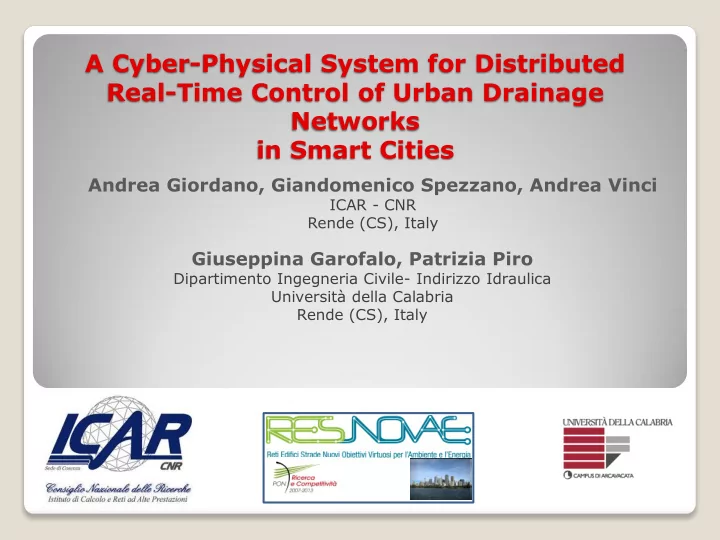

A Cyber-Physical System for Distributed Real-Time Control of Urban Drainage Networks in Smart Cities Andrea Giordano, Giandomenico Spezzano, Andrea Vinci ICAR - CNR Rende (CS), Italy Giuseppina Garofalo, Patrizia Piro Dipartimento Ingegneria Civile- Indirizzo Idraulica Università della Calabria Rende (CS), Italy
Background • The magnitude and the frequency of flooding in urban areas are likely to increase due to • climate change • expanding urbanization • In current practices, engineers and administrators focus their attention on flooding phenomena due to rivers inside the cities • Conversely, There is not enough attention Sewer system toward flooding triggered by overload conditions occurring in the sewer system ( sewer flooding ). • Flooding phenomena give rise to potential risks to human life, economic assets and the environment, etc. 2 IDCS 2014, Sept 22 – 24, Calabria, Italy
Flooding phenomenon Road surface Drains 3 Sewer system IDCS 2014, Sept 22 – 24, Calabria, Italy
Flooding phenomenon Road surface Drains Sewer system 4 IDCS 2014, Sept 22 – 24, Calabria, Italy
“Smart” Gates electronically adjustable gates. They allow you dynamically changing the flow of the water 5 DSRT 2011, September 4 - 7, Salford, UK IDCS 2014, Sept 22 – 24, Calabria, Italy
Distributed real-time control Real time control: ◦ Reading from sensors ◦ Elaborating information (as soon as possible) ◦ Actuating on the gates Issues related on ‘centralized’ control ◦ Need for comprehensive mathematical model of the whole hydraulic network ◦ Need for communication between each sensor and gate and the centralized control ◦ the huge amount of the incoming data gives rise to real time constraint violation Proposed approach: fully distributed : ◦ Computational nodes spread across the drainage network ( RaspBerry ) ◦ Only short-range communications are required ◦ Enabling Agent-based e Swarm Intelligence 6 IDCS 2014, Sept 22 – 24, Calabria, Italy
Drainage network A drainage network is made up of: ◦ conduits , i.e. pipes where water flows ◦ Inlet nodes , i.e. water entry points (manhole) ◦ Outlet nodes , i.e. exit points where water is discharged into a river, lake, reservoir and so forth ◦ Junctions , i.e intersection points for conduits A whole drainage network of a city can be broken down in a set of not connected tree-like structured drainage networks which own only on outlet node 7 IDCS 2014, Sept 22 – 24, Calabria, Italy
Drainage network A drainage network is defined in a recursive way: it is made up of a main channel into which recursively defined (sub)network discharge. The recursive process stops when reaching the Most simple Drainage Network (MSDN) made up of only a conduit and an inlet node. 8 IDCS 2014, Sept 22 – 24, Calabria, Italy
Drainage network 9 IDCS 2014, Sept 22 – 24, Calabria, Italy
Generated networks 10 IDCS 2014, Sept 22 – 24, Calabria, Italy
Gates position The gates are inserted at the start of each branch, i.e. between the junctions of the main channel and the sub-networks 11 IDCS 2014, Sept 22 – 24, Calabria, Italy
Gate-agents One agent per gate One agent per outlet node The whole problem become: «for each network, each agent has to tune its gate in order to ensure that filling levels of the conduits are balanced as much as possible» 12 IDCS 2014, Sept 22 – 24, Calabria, Italy
agent algorithm agents continuously execute two tasks: ◦ Task 1 : Figuring out the average of the water level in the specific network ◦ Task 2 : triggering specific gates in order to bring the water level closer to that average 13 IDCS 2014, Sept 22 – 24, Calabria, Italy
Task1: Gossip-based algorithm Nodes own such numerical values The goal is to compute global average even if each node is able to communicate only with neighbour nodes Each node holds the current “local” average value (initially sets to the measured value) These local average values are continuously exchanged among neighbor nodes which update their local averages by applying the average operator It can be proved that the algorithm converges to the global average value after an enough steps * The algorithm ensures fault tolerance and adaptivity * Jelasity M., Montresor A., Babaoglu O., Gossip-based aggregation in large dynamic networks, ACM Transactions on Computer Systems 23, 3, 219 - 252, 2005. 14 IDCS 2014, Sept 22 – 24, Calabria, Italy
Task2: how to tune the gate? Even though we know the optimal water level to set, we don’t know how to adjust gates so as to get it 15 IDCS 2014, Sept 22 – 24, Calabria, Italy
PID Controller The average value computed in task1 is used as setpoint of a PID ( P roporzionale, I ntegrativo, D erivativo) controller t d u t K e t K e d K e t e t setpoint t output t p i d dt 0 Average Water level Gate opening degree 16 IDCS 2014, Sept 22 – 24, Calabria, Italy
SWMM simulation software 17 DSRT 2011, September 4 - 7, Salford, UK
Customizing SWMM SWMM Real-Time A A connector A A A A A A A A A A Gossip-Algorithm + PID 18 DSRT 2011, September 4 - 7, Salford, UK
Experimental results Uncontrolled Controlled 19 IDCS 2014, Sept 22 – 24, Calabria, Italy
Any questions? 20 IDCS 2014, Sept 22 – 24, Calabria, Italy
Recommend
More recommend